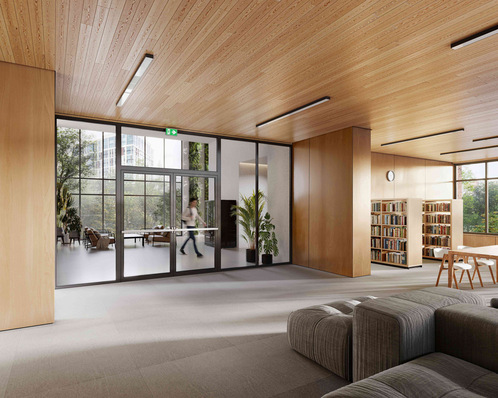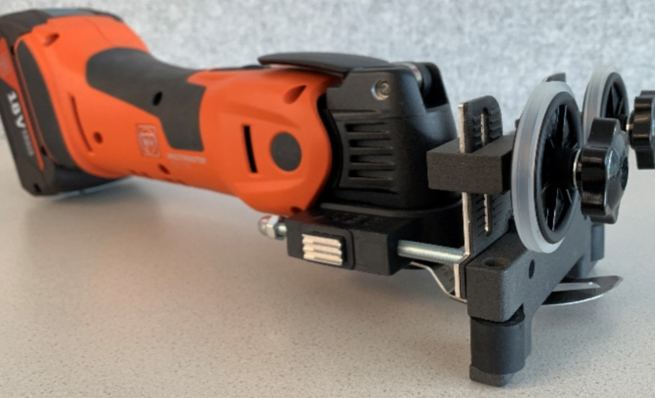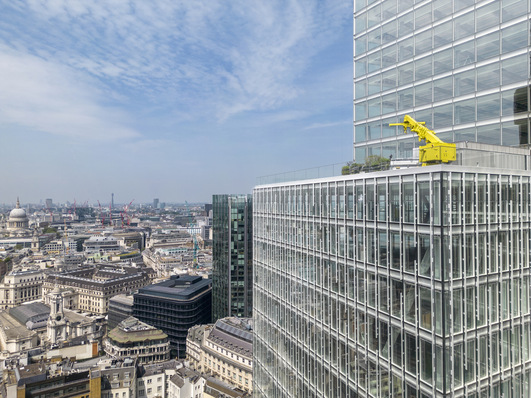"Our glass world will change. We will deal with many new topics and find new solutions for many of our customers, because such challenges spur us on," Hans-Joachim Arnold emphasised. Some topics, especially unpleasant ones, are still being pushed aside. But without innovations, there would be no progress. And one should not forget: someone will stand up and implement it. "Be one of them. The future needs good ideas; actively help shape tomorrow," said Arnold.
Arnold cited bird protection glass as a successful example of such an approach: "At first we were ridiculed, but after 25 years it was one of the main topics in the glass hall at BAU 2023, where appropriate bird protection-friendly glass was now presented by all major glass suppliers."

Matthias Rehberger / GW
Climate change will probably be one of the biggest challenges for our society. Approaches to a long-term solution are needed here, and glass will play an important role in this.
Climate researcher Stefan Rahmstorf says: "We will have to deal with many heat deaths. Cooling homes in summer is therefore becoming increasingly important here and throughout Europe. Insulating glass that keeps the heat out can help us here."
What can IGU manufacturers do?
"Look at climate change as a promising business model for you!" Climate-optimised buildings need an optimised facade and thus, of course, the right insulating glass, Rahmstorf said.
Overall, he sees politicians and companies as having a responsibility, as we need structural changes that individuals alone cannot implement.
Susanne Stolper, Associate Director at the international engineering firm Arup, added further considerations on climate change: "Sustainable building is becoming more and more interesting for investors, among other things due to increasing legal requirements and also on the part of many building owners who want sustainable buildings. Old buildings that have not been renovated or cannot be renovated no longer arouse interest. Furthermore, the interest of the capital markets in sustainable investments is growing, among others among institutional investors and asset managers as well as banks and insurance companies.
These trends speak for sustainable buildings and sustainable building products.
In the shift to sustainable building, we now need to look further up the supply chain. It is crucial to know how sustainable buildings are invested in, as this has a specific impact on building investments.
See also: Futuristic glass windows for impossible architecture in Austria
Susanne Stolper: "There are six goals that need to be achieved: Reducing CO2 emissions, improving the recyclability of raw materials, using recyclable materials, the impact of building product manufacturing on the carbon footprint, organising recycling and integrating recycling into the supply of building products."
This also includes the energy consumption of buildings and the so-called "grey energy" that is used for the production of building products. Susanne Stolper: "The goal must be to achieve energy-efficient building standards and for this we need appropriate building components. In renovations, too, we should weigh up which parts have to be demolished and which can be retained in order to save energy and CO2 emissions. Glass plays an important role here as a sustainable building product.
What the expert from Schüco had to say

Matthias Rehberger / GW
In his presentation on the European Taxonomy and the Circular Economy, Hans-Walter Bielefeld from Schüco explained the challenges that manufacturers and suppliers of building products will face. The taxonomy broadly defines three sustainability goals, of which the speaker focused particularly on the reduction of CO2 emissions and increased recycling.
How these goals are to be achieved depends on the object in question: When renovating existing buildings, one should concentrate on CO2 reduction, whereas with new buildings, the focus must be particularly on grey energy.
Bielefeld emphasised: "However, there cannot be one solution. Different functions require different solutions." For example, in the case of a refurbishment, it often makes sense to clarify individually which elements, such as concrete walls, could be left standing or which doors or windows could be reused elsewhere.
That is why EPDs are needed
Alexander Rudolphi from the DGNB took up the topic of EPDs and emphasised that they are not certificates. He expressly advised glass manufacturers and their suppliers to declare their products, as these would be subject to much stricter environmental requirements in future.
Also interesting: Programme for Glass Performance Days 2023 finalised
Clear or comparable information on deconstruction and recycling suitability would therefore also be a competitive advantage.

Matthias Rehberger / GW
Carl Pinnekamp honoured for 20 years of board work
During the conference, Carl Pinnekamp, Managing Director of Teutemacher Glas GmbH, was honoured for his 20 years of work in the Isolar Group and on the Group Board.
Hans-Joachim Arnold thanked Pinnekamp for his commitment: "Carl has made an important contribution to the development of our group over decades as a member of the board. And for that, on behalf of the group members, I want to thank him again most sincerely for his dedication and output."
As part of the conference, the Isolar Group announced the winners of the Isolar Object Competition for 2023.














